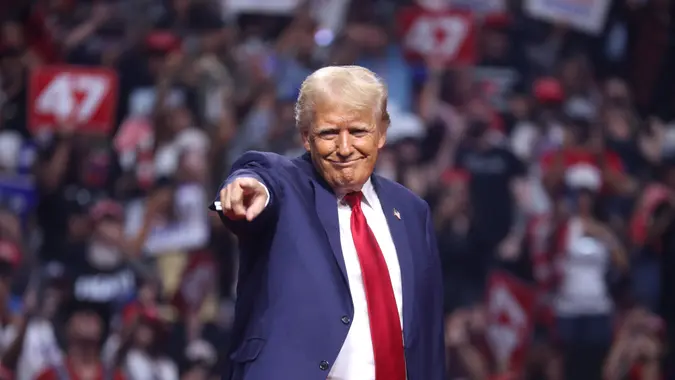3 Retailers Whose Prices May Stay The Same Even After Trump’s Tariff Increase

Commitment to Our Readers
GOBankingRates' editorial team is committed to bringing you unbiased reviews and information. We use data-driven methodologies to evaluate financial products and services - our reviews and ratings are not influenced by advertisers. You can read more about our editorial guidelines and our products and services review methodology.

20 Years
Helping You Live Richer

Reviewed
by Experts

Trusted by
Millions of Readers
President-elect Donald Trump’s plans to impose stiff tariffs on imported goods have already caused some retailers to consider shifting their pricing strategies. One of those retailers, discount chain Dollar Tree, recently said it might need to raise prices from their current level of $1.25 to deal with higher expected costs caused by the proposed tariffs, CNN reported.
Trump’s proposals include levying a 25% tariff on imports from Canada and Mexico and imposing an additional 10% tariff on goods from China, Retail Dive reported. In China’s case, tariffs could rise as high as 60%. Imports from all countries could see tariffs of up to 20% — a move designed to bolster domestic manufacturing but one that could also lead to higher consumer prices.
The proposed tariffs are “very concerning” for retailers that source materials from countries like China or Taiwan, according to Michael Yamartino, CEO of Route, apost-purchase platform that powers shipping protection and package tracking for 13,000 brands.
“With a sizable amount of the production ecosystem based in these countries, it has been a reliably easy way for retailers to source production for years,” Yamartino told GOBankingRates.
Some retailers will be impacted more than others, however. Here are three retailers whose prices might stay the same even after tariffs are imposed.
Home Depot
Home Depot’s previous experience dealing with tariffs during Trump’s first term in office should put it in decent shape to contain costs and hold prices steady, according to recent comments made by executives at the home improvement chain.
As Retail Dive reported, Home Depot took a “data-driven approach” to analyzing the tariff impact at the SKU-level. This approach allowed it to “dramatically decrease” costs related to tariffs. The retailer also sources more than half of its goods from North America – including nearly 80% of its lumber. This means it has more exposure to Chinese tariffs than many other chains.
Steve Madden
Many larger retailers, including shoes/fashion chain Steve Madden, have anticipated the tariffs and “already begun strategizing” to avoid the impending cost hit, Yamartino told GOBankingRates.
“Steve Madden, an early mover reacting to the potential tariffs, announced in November that they’d be cutting their Chinese production in preparation for the tariff effects,” he said. “Smaller brands may not be able to pivot so quickly. It’s a challenge to research, source, and switch to other manufacturing options, and this effort is a significant drain for companies with less expendable resources and time.”
Burlington Coat Factory
Burlington is among the chains that doesn’t depend a whole lot on imports, so it shouldn’t feel nearly as big an impact from tariffs as other retailers. In 2024 Burlington directly imported only about 8% of its merchandise, Retail Dive reported.
“Well over 90% of our buys are on merchandise where we are not directly paying the tariff,” Burlington Chief Financial Officer Kristin Wolfe told analysts last month.
She added, because Burlington is an off-price retailer with a “flexible” buying model, it can negotiate the prices it pays and help mitigate the tariff impact.
More From GOBankingRates
 Written by
Written by  Edited by
Edited by 

























